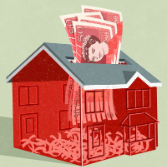All Activity
- Yesterday
-

Credit deflation and the reflation cycle to come (part 9)
Long time lurking replied to spunko's topic in Property Prices & Economy
WTF -

Credit deflation and the reflation cycle to come (part 9)
Mandalorian replied to spunko's topic in Property Prices & Economy
So exactly as I said then. -

Credit deflation and the reflation cycle to come (part 9)
sancho panza replied to spunko's topic in Property Prices & Economy
via Luke Gromen X feed I know basement has been discussing dedollariaztion for some time and the end of the US empire.but some MSM coverage/discussion is nice to see. https://www.bloomberg.com/opinion/articles/2024-04-21/china-russia-iran-axis-is-bad-news-for-trump-and-gop-isolationists The Second Cold War Is Escalating Faster Than the First So what are the biggest differences between Cold War I and Cold War II? First, China is a much bigger economic contender than the Soviet Union ever was. Second, the West is economically entangled with China, through a vast web of supply chains, in a way we never were with the USSR. Third, we are much weaker in terms of manufacturing capacity. With China flooding the world with cheap “green” stuff, the West has no option but to revive protectionism and industrial policy, turning the economic strategy clock back to the 1970s, too. Climate adviser John Podesta made that clear last week at Bloomberg’s BNEF Summit. Treasury Secretary Janet Yellen complained last month that Chinese “excess capacity … in ‘new’ industries like solar, EVs, and lithium-ion batteries” was “hurt[ing] American firms and workers, as well as firms and workers around the world.” Fourth, US fiscal policy is on a completely unsustainable path. To run a 7% deficit at a time of full employment is, to put it mildly, not what the macroeconomics textbooks recommend. More importantly, as the Congressional Budget Office has just pointed out, the relentless growth of the federal debt in public hands relative to gross domestic product — from 99% this year to a projected 166% by 2054 — will inevitably constrain future administrations, for the simple reason that an inexorably rising share of revenues will have to go on servicing the debt. My sole contribution to the statute book of historiography — what I call Ferguson’s Law — states that any great power that spends more on debt service (interest payments on the national debt) than on defense will not stay great for very long. True of Hapsburg Spain, true of ancien régime France, true of the Ottoman Empire, true of the British Empire, this law is about to be put to the test by the US beginning this very year, when (according to the CBO) net interest outlays will be 3.1% of GDP, defense spending 3.0%. Extrapolating defense spending on the assumption that it remains consistently 48% of total discretionary spending (the average of 2014-23), the gap between debt service and defense is going to widen rapidly in the coming years. By 2041, the CBO projections suggest, interest payments (4.6% of GDP) will be double the defense budget (2.3%). Between 1962 and 1989, by way of comparison, interest payments averaged 1.8% of GDP; defense 6.4%. -

Credit deflation and the reflation cycle to come (part 9)
sancho panza replied to spunko's topic in Property Prices & Economy
lets not be 'giving it away' CV. The Fool are buying in. Decl:we're donw about 30% excluding divis,ladders from 125 to 75.....5% position. https://uk.finance.yahoo.com/news/3-reasons-why-vodafone-shares-151400321.html 3 reasons why Vodafone shares look dirt-cheap! Is it now time to buy? Earnings For this financial year (to March 2025), Vodafone trades on a forward price-to-earnings (P/E) ratio of 9.3 times. This reading — which is built on City expectations that earnings will rise 17% year on year — is below the Footsie average of 10.5 times. Vodafone’s share price also commands a price-to-earnings growth (PEG) ratio of 0.6. Any sub-1 reading indicates that a share is undervalued relative to its growth prospects. Dividends Vodafone grabbed the headlines earlier this year when it announced plans to rebase the dividend. This came as no surprise to many: talk of a reduction had long been circulating due to the firm’s high debts. Yet based on City forecasts, the company’s dividend yield for financial 2025 still stands at 7.9%. This is more than double the 3.5% FTSE 100 average. Assets Finally, Vodafone’s shares look dirt cheap relative to the value of the firm’s assets. This can be evaluated using the price-to-book (P/B) ratio. Like the PEG ratio, a reading below 1 indicates that a stock is undervalued. Today, Vodafone’s multiple sits at a rock-bottom 0.4. Why is Vodafone so cheap? The cheapness of this particular Footsie stock is down to several reasons. Firstly, the size of Vodafone’s debt pile continues to spook investors despite the company’s decision to slice dividends. Net debt was €33.3bn at the end of March, roughly unchanged year on year. Also, Telecoms is a very capital-intensive business. And so fears that high debt levels will endure — a scenario that could drag on the firm’s growth plans and dividend policy — remain a problem. Finally, worries over Vodafone’s troubles in Germany are also dampening its share price. Changes to laws concerning services bundling have smacked the company’s performance in its single largest market. Is now the time to buy? So should investors consider buying Vodafone shares, then? I think the answer is yes. Following the sale of its underperforming Spanish and Italian units, and with steps to reverse its fortunes elsewhere paying off, I think the Footsie firm’s share price could continue heading higher. -

The Big Short Time and Furnished Holiday Let thread ...
One percent replied to spygirl's topic in Property Prices & Economy
Good luck with that, bookings have fallen off a cliff. on a different note, a local group here has done a new calculation on the number of non-residential properties (either fhl or second homes) in the town. Last calculation maybe three years ago was 28 percent. It’s now at 38 percent. -

The Big Short Time and Furnished Holiday Let thread ...
sancho panza replied to spygirl's topic in Property Prices & Economy
love the way they anticipate rasiing prices into a cost of living crisis https://uk.finance.yahoo.com/news/nine-10-holiday-let-owners-160000664.html Nine in 10 holiday let owners to raise prices ahead of tax raid Nine in 10 holiday let owners say they will increase the price of bookings ahead of Jeremy Hunt’s £300m tax raid on second homes. From April next year, holiday homeowners in England will no longer be able to offset their mortgage interest payments from profits and will lose generous tax perks on capital gains. Higher rate taxpayers face the prospect of paying 24pc tax on profits from a sale rather than the 10pc they currently benefit from via Business Asset Disposal Relief. The average annual income for a three-bed holiday let is £24,500 and £16,300 for a one-bed property, according to letting platform Sykes Holiday Cottages, but profits are due to take a hit thanks to the Chancellor’s tax overhaul. Calculations by wealth planning firm Quilter show that holiday homeowners could be £3,000 a year worse off. The figures are based on a property purchase price of £350,000, with an annual mortgage rate of 4.5pc and £20,000 rental income. In a bid to soften the impact of the greater tax burden, 87pc are planning to increase the cost of bookings, according to a survey of 500 holiday let owners. -

Credit deflation and the reflation cycle to come (part 9)
DurhamBorn replied to spunko's topic in Property Prices & Economy
They will be expecting the new CEO to cut the divi to speed up the fibre build and the shares will tank (though that would likely by short lived).However whatever speed the build we will end up with three players,them,Tef/Virgin and likely Cityfibre who themselves will have big debts by the time build is finished.They turned EBITDA positive in the last quarter,but will still be burning cash at the moment.The VOD divi cut has given her cover,though she does not need to cut it as the balance sheet is not stretched.Inflation staying high will be bullish for all three in the end as its very unlikely any other player will be able to enter the market and compete,unless big tech decides to burn £15bill to build a network.BT has done very well so far with the build,but there is a chance they cut the divi for 3 years,if they do decide to speed the build up. Biggest risk is government stealing the future profits and also gilts blowing up taking their pension scheme with them. Her first results will be this Thursday so she will lay out the rest of the fibre build then and if there are any changes -

Credit deflation and the reflation cycle to come (part 9)
TNS replied to spunko's topic in Property Prices & Economy
I fuckin hope so! -

Credit deflation and the reflation cycle to come (part 9)
Joncrete Cungle replied to spunko's topic in Property Prices & Economy
BT subject to some heavy shorting today. https://shorttracker.co.uk/company/GB0030913577/ Wonder if they will get burned? -

Credit deflation and the reflation cycle to come (part 9)
Castlevania replied to spunko's topic in Property Prices & Economy
I’d be happy with a takeover around a £1 to put me out of my misery. -

Credit deflation and the reflation cycle to come (part 9)
DurhamBorn replied to spunko's topic in Property Prices & Economy
PGMs catching a bid today ,the market will be seeing Anglo maybe floating off its PGM business as very bullish for the basket price longer term.You could argue Anglo is saying they do not want to invest capital in SA.It could also see more action in the sector.Very unlikely Impala or Sibanye could afford to buy AAP,even as a joint bid,but a fully independent AAP might try to consolidate the industry itself.You start to understand why Froneman was happy to keep the US business though even loss making.If a big BRIC miner or group buys out AAP you could have a situation where the west loses access to PGMs,or faces competing for metals in big deficits at spot.There is a very real chance PGMs go into a huge bull market in a few years. -

Credit deflation and the reflation cycle to come (part 9)
DurhamBorn replied to spunko's topic in Property Prices & Economy
Even with the divi cut,divi 5%,lots of debt fixed at 3%,so better to buy back shares.I agree with you though,but i suspect they are trying to sort the business out etc before someone launches a hostile bid.Bid debt,less shares will put off bidders.I suspect if the debt was £20bill we would see a takeover move. -

Property crash, just maybe it really is different this time (Part 3)
nirvana replied to spunko's topic in Property Prices & Economy
it restarted with covid didn't it? lol.....hence the 'hyper-inflation' now.......give over bruv, it's not that bad, the government says they're gonna cut interest rates soon, innit...... dunno bruv, massive amounts of money printing never ends well......I think the west has truly fukked itself now and why they are gunning for WW3......blame someone else eh?? -

Property crash, just maybe it really is different this time (Part 3)
nirvana replied to spunko's topic in Property Prices & Economy
-
Credit deflation and the reflation cycle to come (part 9)
janch replied to spunko's topic in Property Prices & Economy
I've also been in and out of BT and made a profit. I went in again in July 23 at around £1.21 hoping for a repeat. -

Credit deflation and the reflation cycle to come (part 9)
MightyTharg replied to spunko's topic in Property Prices & Economy
Why do that if they are a bazillion pounds in debt? Seems silly. -

Credit deflation and the reflation cycle to come (part 9)
Long time lurking replied to spunko's topic in Property Prices & Economy
-

Credit deflation and the reflation cycle to come (part 9)
DurhamBorn replied to spunko's topic in Property Prices & Economy
I got lucky on BT,i bought a big holding at £1 during the COVID lows and sold them near £1.90 and bought them back at £1.13.Its thanks to that,Turkcell double,50+ on the Brazil telcos that the sector has still been ok for me.TEF has also returned 35% over 3 years,not setting the world on fire,but good enough.My main worry with them all now is governments and regulators.The compaies have spunked shareholder capital into building modern telcos networks for countries and at some point should see falling Capex and stable Opex,then fast increasing divis etc unless governments decide fat Shaz should see the return instead of the owners. -

Credit deflation and the reflation cycle to come (part 9)
DurhamBorn replied to spunko's topic in Property Prices & Economy
Likely they will do another £2bill next year once Italy goes as well and about £5 bill off the debt.Debt should be £25bill after the transactions with a free cash flow of around £3bill,still a weak position.Divi bill will be down to less than a bill though,so they should be able to de-leverage without any more corporate action by 9% a year so IF they dont cock up anymore they should move to divi increases,within two years.I think the problems with VOD is the managers think 2.5x debt to EBITDA is fine,but i dont think it is.The debt to free cash is around 8x.VODs debt profile is as good as you will see,well spread with good rates,but i would say the C suite have done a terrible job over the last decade when £13bill EBITDA only returns £3bill net cash.Im still around 20% down on them on a big holding when counting divs,but against inflation around 36% down,easily my worst holding.However,IF they can see EBITDA growth and if they can get a grip of CAPEX and OPEX and de-lever below £20bill they should deliver in the end.You get the feeling though the CEO is avoiding using all the sale proceeds for de-leverage because its likely only the debt thats stopped them being bought out.Once the two sales and 3 merger complete though you get the feeling they are a sitting duck for a £1 a share takeover offer. -
Credit deflation and the reflation cycle to come (part 9)
janch replied to spunko's topic in Property Prices & Economy
Both VOD and BT are on the up. I hope it lasts as we've waited long enough -

Credit deflation and the reflation cycle to come (part 9)
Long time lurking replied to spunko's topic in Property Prices & Economy
They really get shit done -

Credit deflation and the reflation cycle to come (part 9)
Long time lurking replied to spunko's topic in Property Prices & Economy
-

Credit deflation and the reflation cycle to come (part 9)
DoINeedOne replied to spunko's topic in Property Prices & Economy
Spain sale approved, €2bn share buyback to begin Vodafone Group Plc ("Vodafone") announces today that the sale of Vodafone Spain to Zegona Communications plc ("Zegona")1 has received final approval from the Spanish authorities. The sale is expected to complete at the end of May 2024, at which point Vodafone will receive €4.1 billion in cash (subject to customary closing adjustments) and €0.9 billion in the form of Redeemable Preference Shares. As a result, Vodafone now intends to commence an initial €500 million share buyback programme on 15 May 2024, as part of our plans to return €2.0 billion over 12 months. Notes 1. The selling entity is Vodafone Europe B.V. which is a 100% owned subsidiary of Vodafone Group Plc. The buying entity is Zegona Bidco, S.L.U. which is a 100% owned subsidiary of Zegona Communications plc. -
Credit deflation and the reflation cycle to come (part 9)
JMD replied to spunko's topic in Property Prices & Economy
Yes the elder generations were realists and knew the score. Actually, my own grandparents used to use that same phrase... 'the best hope is that our government don't take the country to war'. Scary thing is that the younger generation have done a 180 and naively believe 'Big Government' can solve problems!! -

Credit deflation and the reflation cycle to come (part 9)
Axeman123 replied to spunko's topic in Property Prices & Economy
Markets shrugging off PPI numbers so far, silver up and approaching $29 for example.










